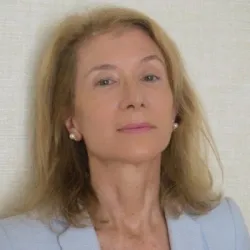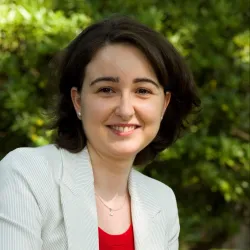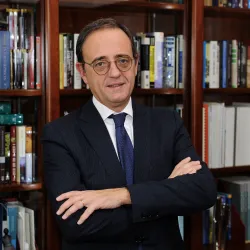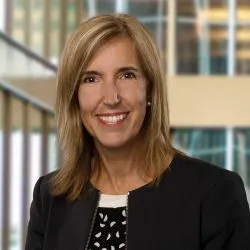Climate Change: Managing Financial Risks and Green Finance Initiatives 2022b
Climate Change: Managing Financial Risks and Green Finance Initiatives 2022b
Climate Change: Managing Financial Risks and Green Finance Initiatives
September 19 – 22
Live Content sessions held: 9am–1pm (EDT) | 2pm–6pm (BST) | 9pm–1am (SGT)
Chair: Freyr Hermannsson, former head of treasury, Central Bank of Iceland
In 2022, it is no longer a question of whether central banks should address climate change, but rather a question of how. Increasingly governors, boards and stakeholders recognise that central banks impact extends beyond portfolio and treasury considerations to supervision and to its carbon footprint. Climate is a strategic issue. Yet, questions remain around how to incorporate climate change into existing mandates, objectives, policies and strategic plans. Is a centralised function needed or do specialist areas need specialised expertise?
This course is designed to equip central bankers to meet these challenges. Each day will feature three hours of expert-led Live Content to maximise the opportunity to share and learn. The chair will ensure participants have opportunities to network throughout the course, with time set aside for a workshop on implementing key learnings.
Agenda
Two weeks prior to your training course you will be emailed access to our content hub with course materials, including a trial to Central Banking if you are not already subscribed. There will be a combination of articles, reports and presentations that will contribute to two hours of preparation time for the live content. Presentations for the sessions will also be held here subject to the speaker approval.
New roles and responsibilities for central banks
14:00 – 14:30
Course introduction
Course introduction session led by the chair
14:00 - 14:30
- Introductions and welcome from the chairperson
- Overview of the training course
- Discussion of the attendee expectations
Freyr Hermannsson is an experienced central banker and has worked with a dozen central banks and United Nations agencies since the turn of the century. He is an independent advisor focusing on sovereign asset and liability management, particularly balance sheet management and central bank policy solvency, reserve management and public debt management. He has hands-on knowledge of monetary and exchange operations, FX markets development, exchange rate regimes, FX regulations (incl. capital controls) and capital account liberalization, central banking recapitalization and related accounting issues.
Mr. Hermannsson initially joined the Central Bank of Iceland in 2000 and after several years in the private sector was drafted back into the central bank in Iceland’s 2008 financial crisis where he served as Head of Treasury. He led international reserves management, implemented central bank open market operations, negotiated government debt transactions, developed capital controls, and worked on crisis prevention and management during and after the crisis of 2008.
A mathematician by education, he holds a M.Sc. from Columbia University in Operation Research and a B.Sc. in Mathematics from the University of Gothenburg, Sweden. He has lectured on the mathematics and economics of financial markets as an Adjunct Lecturer at the Faculty of Economics of the University of Iceland.
14:30 – 15:30
Climate change as an emerging source of systemic risk and instability
14:30 - 15:30
- Overview of key transition, physical and liability risks
- What are the implications of climate change for financial stability?
- Examples of technology and policy solutions for effective risk management
- Key challenges for 2022 and beyond
María J. Nieto (PhD) is a Visiting Senior Fellow at the London School of Economics (Grantham Research Institute), Member of EBI and former Senior Advisor at Bank of Spain. She is author of numerous peer-reviewed articles (Journal of Banking and Finance, Journal of Financial Stability, Journal of International Financial Markets, Institutions and Money among others). She has cooperated as advisor with the International Monetary Fund and the Federal Reserve Bank of Atlanta for over 10 years and she serves on the advisory boards of the Journal of Financial Regulation and Compliance, the Journal of Financial Regulation, the Central Banking Training Advisory Board (UK) and the Institute of International Monetary Economics (UK). She has a PhD from University Complutense de Madrid, an MBA in finance from the University of California, Los Angeles (UCLA), and is a Certified Public Accountant (CPA)
15:30 – 15:45
Break
15:30 - 15:45
15:45 – 16:45
Effective disclosures: improving governance by improving transparency
15:45 - 16:45
- Areas of the TCFD framework useful for central banks’ own disclosures
- NGFS Guide on climate-related disclosure for central banks
- Opportunities and challenges of climate disclosures
- Discussion: should central banks lead by example on climate-related disclosures?
Clara I. González is Senior Economist at Banco de España in the Analysis and Market Intelligence Division (Operations Department). Since 2018, she is involved in the internal work of the Banco de España regarding the challenges posed by climate change for the financial system and the development of sustainable finance. She has been a member of several international committees on this topic at the NGFS, ECB, FSC and ESRB. She works on sustainable finance topics, the implications of climate change for monetary policy and the incorporation of sustainable and responsible investment principles in portfolio management, participating in the Eurosystem’s related work in this area and in the WS3 of the NGFS focused on scaling up green finance.
Previously she worked in the Financial Stability and Macroprudential Policy Department (2015-2020) and in the International Markets Division (2012-2015) at Banco de España. Prime Minister Economic Bureau (2008-2011), Fundación de Estudios de Economía Aplicada (2007-2008), and in the Economic Analysis and Forecasting Department at Banco de España (2005-2007). She holds a PhD in Economics (Universidad Complutense de Madrid, Spain) and her dissertation was awarded with “Cum Laude” and the Prize Funcas-"Enrique Fuentes Quintana" to the best thesis in 2011-2012. She holds a Degree in Business Administration and a Master’s Degree in Actuarial and Financial Sciences (both Universidad Pontificia Comillas de Madrid, Spain). Member of the Spanish Professional Society of Actuaries. She has several publications on sustainable finance, implications of climate change for the financial system, ageing and the sustainability of the Spanish public pension system.
16:45 – 17:00
Break
16:45 - 17:00
17:00 – 18:00
Green taxonomies and disclosure requirements
17:00 - 18:00
- The EU green taxonomy and its applications
- Disclosure requirements linked to the EU green taxonomy
- Estimating the taxonomy-alignment and the exposure to transition risk in financial portfolios
- Discussion: which taxonomies are participants using in their own organisations?
Lucia Alessi is Responsible for Sustainable Finance at the Joint Research Centre of the European Commission. Her team develops research in support of EU policymaking on sustainable investments and ESG risks. Her more recent research focuses on the development of carbon stress tests and the assessment of ESG risks for banks, on the analysis of investors' attitude towards climate risk, and on the EU green Taxonomy. From 2007 to 2015 she worked at the European Central Bank, where she served in various areas, including Research, Economics, and Macroprudential Policy and Financial Stability.
Incorporating climate risks and sustainability in portfolio management and monetary policy
14:00 – 15:00
Adapting monetary policy operational frameworks to reflect climate-related risks
14:00 - 15:00
- The challenges of assessing the consequences for monetary policy effectiveness
- Identifying the options that a central bank could consider
- Assessing potential climate-related adjustments to monetary policy operational frameworks
- Discussion: is disclosure a prerequisite for other potential adjustments?
Andreas Breitenfellner is Lead Economist at the Economics Department of the Oesterreichische Nationalbank (OeNB), which he joined in 1999. For several years, he was seconded to the European Commission (DG ECFIN) and the Austrian Delegation to the OECD in Paris. He obtained a master’s degree in social economics at the Johannes Kepler University Linz and a diploma in international relations from the Johns Hopkins University in Bologna. He analyzes and publishes on climate change related economic and financial issues, Economic and Monetary Union, inflation, energy prices and structural policies.
https://www.oenb.at/en/Monetary-Policy/Research/Researchers/andreas-breitenfellner.html
15:00 – 15:15
Break
15:00 - 15:15
15:15 – 16:15
Workshop part 1: climate policy and central bank mandate
15:15 - 16:15
Freyr Hermannsson is an experienced central banker and has worked with a dozen central banks and United Nations agencies since the turn of the century. He is an independent advisor focusing on sovereign asset and liability management, particularly balance sheet management and central bank policy solvency, reserve management and public debt management. He has hands-on knowledge of monetary and exchange operations, FX markets development, exchange rate regimes, FX regulations (incl. capital controls) and capital account liberalization, central banking recapitalization and related accounting issues.
Mr. Hermannsson initially joined the Central Bank of Iceland in 2000 and after several years in the private sector was drafted back into the central bank in Iceland’s 2008 financial crisis where he served as Head of Treasury. He led international reserves management, implemented central bank open market operations, negotiated government debt transactions, developed capital controls, and worked on crisis prevention and management during and after the crisis of 2008.
A mathematician by education, he holds a M.Sc. from Columbia University in Operation Research and a B.Sc. in Mathematics from the University of Gothenburg, Sweden. He has lectured on the mathematics and economics of financial markets as an Adjunct Lecturer at the Faculty of Economics of the University of Iceland.
16:15 – 16:45
Networking break
An opportunity to share experiences with your fellow participants.
16:15 - 16:45
16:45 – 17:45
Workshop part 2: climate policy and central bank mandate
16:45 - 17:45
Freyr Hermannsson is an experienced central banker and has worked with a dozen central banks and United Nations agencies since the turn of the century. He is an independent advisor focusing on sovereign asset and liability management, particularly balance sheet management and central bank policy solvency, reserve management and public debt management. He has hands-on knowledge of monetary and exchange operations, FX markets development, exchange rate regimes, FX regulations (incl. capital controls) and capital account liberalization, central banking recapitalization and related accounting issues.
Mr. Hermannsson initially joined the Central Bank of Iceland in 2000 and after several years in the private sector was drafted back into the central bank in Iceland’s 2008 financial crisis where he served as Head of Treasury. He led international reserves management, implemented central bank open market operations, negotiated government debt transactions, developed capital controls, and worked on crisis prevention and management during and after the crisis of 2008.
A mathematician by education, he holds a M.Sc. from Columbia University in Operation Research and a B.Sc. in Mathematics from the University of Gothenburg, Sweden. He has lectured on the mathematics and economics of financial markets as an Adjunct Lecturer at the Faculty of Economics of the University of Iceland.
Ensuring the financial system is resilient to climate-related risks
14:00 – 15:00
Climate stress testing and modelling
14:00 - 15:00
- Climate change: risks for financial stability
- Climate change: the supervisory approach
- Climate change stress testing: design and conceptual issues
- Case studies: lessons and some results from climate change stress testing
Pedro Duarte Neves is Adviser for the Board of Directors of Banco de Portugal. He was Vice-Governor of Banco de Portugal from June 2006 to September 2017. Pedro Duarte Neves participated at the main high-level supervisory and regulatory fora like the EBA, SSM, ESRB, and FSB. He was Alternate Chairperson of the EBA from July 2013 to June 2018 and he has chaired a number of committees in the scope of the FSB, EBA, and the Joint Committee of the ESAs. His research interests include banking supervision and regulation, macro-prudential policy, and the real economy.
Pedro Duarte Neves is a Visiting Professor at Católica Lisbon School of Business and Economics. He is also Associate at the Systemic Risk Centre, London School of Economics. Pedro Duarte Neves holds a PhD in Economics from Université Catholique de Louvain. He published in scientific journals like The Journal of Econometrics, Economics Letters and Economic Modelling.
15:00 – 15:15
Break
15:30 - 15:45
15:15 – 16:15
Green finance: risks and opportunities. The role of central banks
15:15 - 16:15
- State of the development of green markets, risks and opportunities
- Do climate-related risks and mitigation policies fit into central bank mandates and objectives?
- Should central banks be mandated to play a role in greening the financial system?
- Discussion: what are the risks of overstretching central banks’ mandates?
Dilyara Salakhova is an expert on sustainable finance and financial stability with more than ten-years experience at the ECB and Banque de France. At the ECB, she led the agenda on sustainable finance and worked extensively on green bonds, ESG investments funds, funding of the transition as well as climate-related risks to financial stability. Dilyara helped to inform the policy debate on sustainable finance by contributing greatly to the ECB Opinion on EU Green Bond Initiative, NGFS report on enhancing market transparency in green and transition finance, Joint ECB/ESRB Reports on Climate-related risk and financial stability, ECB Financial Stability Reports. Dilyara has also written several academic publications on the topic.
16:15 – 16:30
Networking break
16:15 - 16:45
16:30 – 17:15
Greening central banks’ internal operations
16:45 - 17:45
- What are central banks doing to green their internal operations?
- Key sustainability goals and targets for cutting central banks’ environmental footprints
- Successes and challenges from central banks with advanced green initiatives
- Discussion: which areas are participants’ own organisations focused on greening?
Julie Champagne was appointed Managing Director of Corporate Services (CS), effective 5 March 2018. In this capacity, she is responsible for the Bank’s Data and Statistics Office (DSO), Knowledge and Information Services, and Security and Facilities Management functions, including plans for continuity of operations.
Ms. Champagne has an extensive background in operational and financial auditing, management consulting, strategic business planning and enterprise risk management. She joined the Bank in 2009 as Deputy Managing Director of Internal Audit and served as Chief Internal Auditor from 2012.
A native of Sudbury, Ontario, Ms. Champagne holds a Bachelor of Commerce (Honours) degree from Laurentian University. She also holds Chartered Accountant and Certified Internal Auditor designations.
Abhishek Chakraborti has a masters’ in electrical engineering from the University of Southern California and an MBA from the University of Alberta. Before joining the Bank of Canada in 2022, he worked as a Program Manager for the City of Edmonton for over 9 years. In this role he supported the city’s long-term environmental sustainability and economic growth. He developed and implemented strategies and programs related to community energy transition and climate resiliency.
For the last one year, Abhishek has been working as a Program Manager to green the Bank of Canada’s internal operations. The Bank has a target to reduce its operational emission to net-zero by 2050.
Emerging challenges in climate change standards in central banks’ strategies
14:00 – 15:00
Climate change and the data challenge
14:00 - 15:00
- Overview of climate-related data needs and gaps
- Strategies for overcoming issues related to data availability, reliability and comparability
- Private data providers and the challenges they present
- Discussion: what challenges does data pose for participants own organisations?
Christian Schmieder joined the Monetary and Economic Department as Head of Administration in 2020 after working on the implementation and effects of financial regulatory reforms in the secretariats of the Financial Stability Board and the Basel Committee on Banking Supervision since 2012. Prior to that, he worked as an Economist at the International Monetary Fund, for the European Investment Bank, the Deutsche Bundesbank and in the private sector. He holds a PhD in business administration and has published a range of studies on banking and financial stability issues.
15:00 – 15:15
Break
15:00 - 15:15
15:15 – 16:15
European Investment Bank as the climate bank
15:15 - 16:15
- Energy lending choices for a public bank
- Paris alignment vs climate action
- Importance of carbon price
- Implications in practice
Eila Kreivi is Chief Sustainable Finance Advisor at the European Investment Bank since February 2022.
From April 2011 until end of January 2022, she headed the Capital Markets Department of the EIB, as its Director. Before that, she was the Head of Funding for the Americas, Asia & Pacific.
Between March 2018 and January 2022, she was an alternate member of the Board of Directors of the European Investment Fund (EIF).
Prior to joining the financing arm of the European Union in 1995, Eila Kreivi worked at the Union Bank of Finland and Société Générale, in Helsinki and in Paris.
She holds a Master of Science degree in Economics from the University of Abo Akademi in Finland. In addition to her native language of Finnish, she is fluent in English, French and Swedish.
Eila Kreivi chaired the Executive Committee of the Green Bond Principles in 2015-2018. She has represented the EIB at the EU High-level Expert Group on Sustainable Finance in 2017‑2018, established by the European Commission. Between 2018 and September 2020, she also represented the EIB at the European Commission’s Technical Expert Group on Sustainable Finance created in 2018. Since October 2020, she is a member of the Platform on Sustainable Finance, an advisory body created by the European Commission.
In July 2020, she was elected as member of the Board of Directors of the International Capital Market Association (ICMA).
16:15 – 16:30
Break
15:00 - 15:15
16:30 – 17:15
Closing remarks and participant action plans
Concluding session led by the chair
16:30 - 17:15
- Summary of the course
- Discussion of the observed trends and case studies
- Application of learning points in the participants’ home organisations
- Preparation of action points
Freyr Hermannsson is an experienced central banker and has worked with a dozen central banks and United Nations agencies since the turn of the century. He is an independent advisor focusing on sovereign asset and liability management, particularly balance sheet management and central bank policy solvency, reserve management and public debt management. He has hands-on knowledge of monetary and exchange operations, FX markets development, exchange rate regimes, FX regulations (incl. capital controls) and capital account liberalization, central banking recapitalization and related accounting issues.
Mr. Hermannsson initially joined the Central Bank of Iceland in 2000 and after several years in the private sector was drafted back into the central bank in Iceland’s 2008 financial crisis where he served as Head of Treasury. He led international reserves management, implemented central bank open market operations, negotiated government debt transactions, developed capital controls, and worked on crisis prevention and management during and after the crisis of 2008.
A mathematician by education, he holds a M.Sc. from Columbia University in Operation Research and a B.Sc. in Mathematics from the University of Gothenburg, Sweden. He has lectured on the mathematics and economics of financial markets as an Adjunct Lecturer at the Faculty of Economics of the University of Iceland.
Learning outcomes
At the conclusion of the training, participants will be able to:
- Incorporate climate change and sustainability into strategic plans
- Understand the interaction of climate policy and central bank mandate
- Understand how central banks are locating and resourcing climate change initiatives
- Assess the impact on domestic and foreign treasury operations
- Gain insights into scenario analysis and stress testing climate risks
Chair

Freyr Hermannsson
Former head of treasury
Former Central Bank of Iceland
Freyr Hermannsson is an experienced central banker and has worked with a dozen central banks and United Nations agencies since the turn of the century. He is an independent advisor focusing on sovereign asset and liability management, particularly balance sheet management and central bank policy solvency, reserve management and public debt management. He has hands-on knowledge of monetary and exchange operations, FX markets development, exchange rate regimes, FX regulations (incl. capital controls) and capital account liberalization, central banking recapitalization and related accounting issues.
Mr. Hermannsson initially joined the Central Bank of Iceland in 2000 and after several years in the private sector was drafted back into the central bank in Iceland’s 2008 financial crisis where he served as Head of Treasury. He led international reserves management, implemented central bank open market operations, negotiated government debt transactions, developed capital controls, and worked on crisis prevention and management during and after the crisis of 2008.
A mathematician by education, he holds a M.Sc. from Columbia University in Operation Research and a B.Sc. in Mathematics from the University of Gothenburg, Sweden. He has lectured on the mathematics and economics of financial markets as an Adjunct Lecturer at the Faculty of Economics of the University of Iceland.








